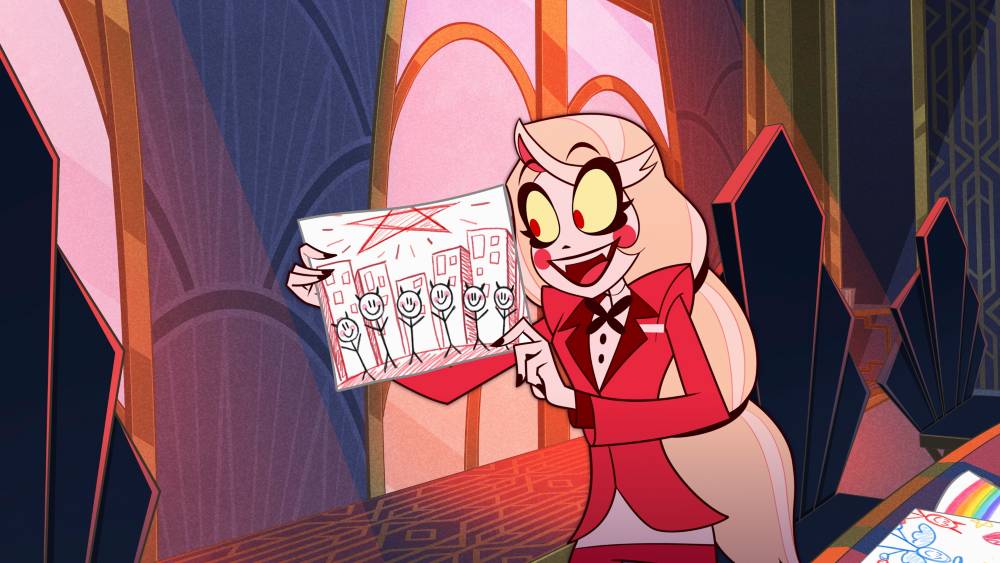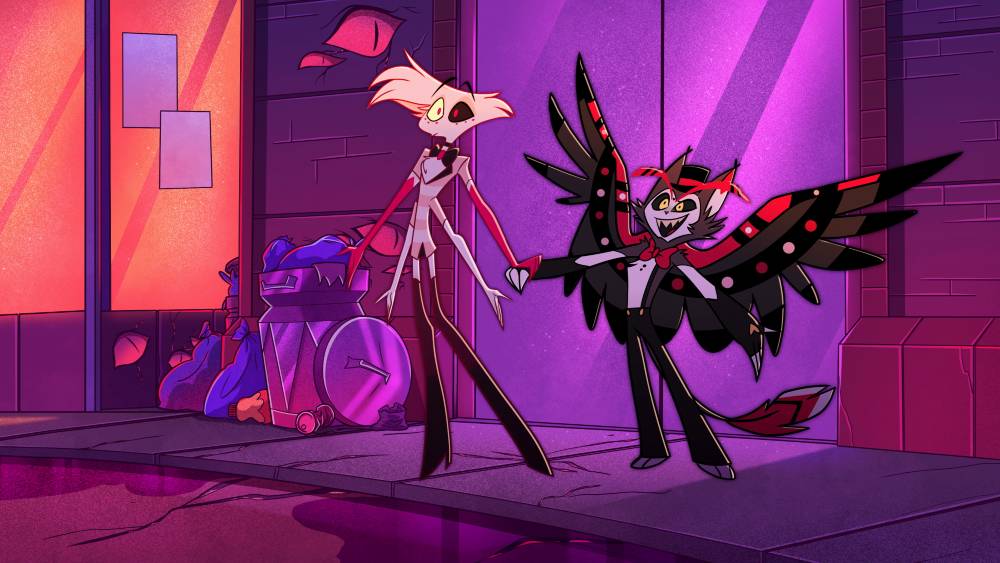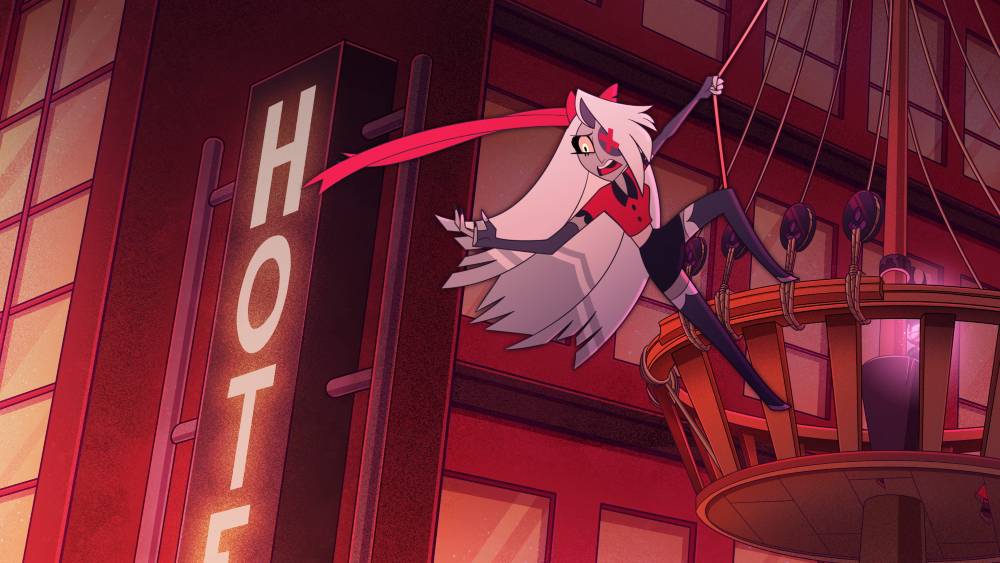Read also:
How to Watch FX Live Without CableHow To Watch AMC Without CableHow to Watch ABC Without CableHow to Watch Paramount Network Without CableMessy writing keeps this solid cast from shepherding Hotel to strong Yelp scores.
Hazbin Hotel is not for me. That is not a bad thing. If every piece of media appealed to everyone, the homogeneity would be stifling. I can see the appeal of a big, bombastic, gleefully violent, heart-on-its-sleeve musical cartoon for grown-ups (heck, I’ve enjoyed my fair share of them)—I just don’t click with the show’s ice-pop made-of-blood aesthetic, and I’m not a huge show-tune guy. Acknowledging the disconnect between the show’s vibe and my personal tastes, as a critic, I have two primary takeaways from Hazbin Hotel‘s first four episodes:
- In terms of animation and voicework, Hazbin Hotel is solid—and Keith David’s turn as the burnt-out bartending demon Husk is a standout among a game cast.
- In terms of writing, Hazbin Hotel is a mess, awkwardly careening between silly and dramatic without precision—most noticeably when it delves into the horrific life of one of its lead players.
Hazbin Hotel‘s aesthetic is built on contrasts—primarily between series heroine Charlie Morningstar (Erika Henningsen)’s deliberate good cheer, bright smiles, and crayon drawings and the continual viciousness of Hell and most of its denizens. Visually, the cast (both the show’s core ensemble and the wider community of Hell) is expressive and distinct. Hell’s assorted players and agents are united across factions by the frequent use of red and black either alone or in concert in costume design. Each faction, in turn, has its own visual signifiers—the staff and residents of the Hotel tend towards a hybrid of casual and professional wear, while a powerful gangster clique goes all in on decadence. Heaven’s murderous, brotastic angels, meanwhile, opt for a more uniform style.

Hazbin Hotel‘s settings are likewise striking. The titular hotel is, appropriately enough, rundown and teetering on the brink of total collapse. But it’s homey compared to the industrialized cruelty of an abusive pimp’s porn studio or the cold angles of an angelic conference room.
The cast matches the animation and design in effectiveness. They handle Hazbin Hotel‘s goofiness and heaviness with skill. And while I do not care for show tunes, I know enough about music to know that these are sung well, and I appreciate the variety within that form (everything from Charlie’s big number about her bold plan to save demons from Heaven’s purges by helping them be better people to an 80s inspired howl of despair from abrasive, abused porn star Angel Dust (Blake Roman).) Among the ensemble, Keith David is far and away the highlight for me. As the once-powerful demon turned perpetually irritated Hazbin Hotel bartender Husk, David gets to delve into his delightful well of irritated-past-his-limit-with-this-nonsense (see the lead-up to his famous fight with Roddy Piper in They Live for an example) and layer born-from-recognition empathy into his often strained relationship with Roman’s Angel Dust. It’s fine, memorable work.

But acknowledging Hazbin Hotel‘s successes in craft and performance, it is undone by messy writing that crashes when trying to hop tones. It is entirely possible to jump between the goofy and the dramatic in a heightened setting—sticking strictly to animation across age groups; see last year’s Scott Pilgrim Takes Off or Spider-Man: Across the Spider-Verse, for instance. Hazbin Hotel does not make that jump. Its tonal shifts are awkward and distracting, and in one case, in the four episodes watched for this review, so drastic that it throws the entire project out of balance.
The show has bleakness built-in—Charlie Morningstar’s hotel is a desperate attempt to stop Heaven from carrying out routine massacres for confirmed fun and possible profit. The show’s bleak side is not the issue in and of itself. No, the issue is that after three episodes where the bleakness was played for dark laughs (Adam [Alex Brightman], the First Man and point man on the purges, is also the First Bro; Radio Demon Alastor [Amir Talai] reacts to a rival’s murderous hatred with wry amusement and calculated retaliation), Hazbin Hotel attempts to treat Angel Dust’s abuse by his pimp/owner/all-around bastard Valentino (Joel Perez) and the maladaptive coping methods Angel Dust resorts to in order to keep himself at all together seriously and with care. In isolation, that’s a worthy idea. In the context of the show, it’s a boondoggle.
Hazbin Hotel attempts to shift into a purely dramatic mode by piling on the misery to such a point that the infamously dour comic strip Funky Winkerbean feels like a barrel of laughs in comparison. Not only is it jarring to go from three episodes of horrific happenings being played largely for dark laughs and transgression to an attempt at exploring the ways that abuse—particularly sexual abuse—can traumatize and entrap someone, but it also puts the latter under harsh light by virtue of how far removed it is from Hazbin Hotel‘s established mode, making any flaws and failings all the more evident. And under this light, Angel Dust’s story, as presented to this point, fails.
Rather than close on a moment of mutual understanding between a man who hates himself and a man who’s learned to live with himself (which works due to Roman and David), Hazbin Hotel attempts to back off of its bleakest moment with a hard tonal reset—interrupting Angel Dust and Husk’s coming to an understanding with a bit of the old ultraviolence, its wacky dial cranked to 11. It’s timid storytelling, retreating into the show’s formula rather than letting things breathe and creating space for a transformed relationship and new context that can add fun layers to later wacky ultraviolence.

For all its craft and fine acting, Hazbin Hotel trips itself up with its fumbled tonal control—whether in attempting particularly dramatic moments or just hopping between goofs and stakes. Acknowledging that it’s not my speed and that others may get more out of it than I do, I do not think it works. There is a host of high-quality animated work for grown-ups in a variety of tones. There are options. Hazbin Hotel is not one I would choose.
Hazbin Hotel is streaming now on Prime Video. New episodes launch on Thursdays.